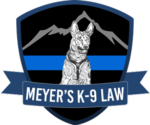Excessive Force; Heck Doctrine; Bystander Liability
Arrest warrant was issued for subject for armed (with a gun) carjacking. About 3 weeks later, 911 call from female who reported a disturbance involving subject. Upon contact with caller, she gave LE additional information that led them to believe subject was at a residence his wife was associated with (LE was familiar with the residence and the wife). When LE arrived, an unidentified female came out onto the porch and spoke with LE. When LE inquired about subject being in the residence, the female said no, but shook her head yes, indicating that not only was subject inside, this female was fearful of him. Several commands were made from the open doorway for occupants to exit the residence. A PSD team had arrived at that point. The wife was just inside the doorway and was loud and argumentative, obstructing LE. More commands were issued including commands to subject by name. A PSD warning was given at that time. Other occupants exited; wife and subject did not. Wife attempted to shut the door on LE several times. Wife then fled inside and LE was able to see subject was at the top of the stairs. LE and subject’s stories diverge at this point. Subject claimed he was complying, was not resisting and had his hands up. LE said when subject’s hand was seized to handcuffed him, subject tensed up and twisted away. This put this officer in between a belligerent wife and the resisting subject. He drew his gun and told wife to back up. When he turned his attention back to subject, subject was advancing on him. Other LE (including handler) saw this as an act of aggression toward the officer, and after at least one more warning, released PSD which bit subject’s leg. Subject continued to resist and was kicking at the PSD. Other LE were able to “assist” the PSD in pulling subject down the stairs. There was additional grappling where subject was hit in the head by LE; subject was then on the ground on his stomach with his hands underneath him. Subject was still fighting and resisting so PSD not removed until subject was handcuffed. Subject’s and wife’s stories were basically that subject was complying and LE attacked subject.
Subject pleaded guilty to resisting arrested, but the court remanded the case to the file for 24 months of good behavior (meaning that if no new charges were brought, the case would be recalled and dismissed). The court held that this resolution did not invoke the Heck doctrine; therefore, the court had to rule on the motion for summary judgment as the Heck doctrine was not applicable.
The court then went on to hold that because the two versions of the events were factually distinct, the motion for summary judgment had to be denied. This included the bystanding officers, because if the jury found that LE used excessive force, then LE at the scene should have intervened.
